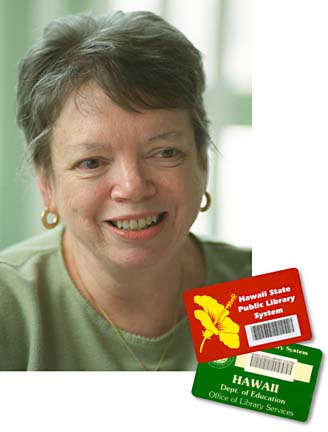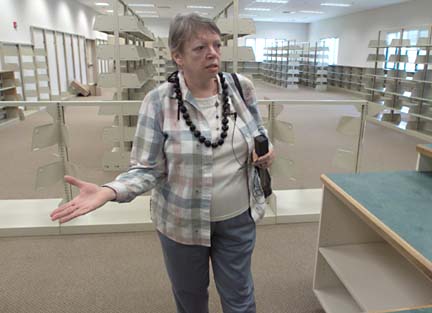
STAR-BULLETIN / 1999
After five sometimes tumultuous years,
Virginia Lowell closes the book on her
tenure as Hawaii's state librarian
When state Librarian Virginia Lowell is on the plane flying from Hawaii to retirement sometime during the next few weeks, "I'll have the Kleenex box out," she said. One person who won't be shedding any tears is Bob Hogue. The Windward Oahu senator says he is glad she's moving on.
Lowell, 62, is closing out a 40-year career that has taken her from her California roots to posts in Michigan, Ohio, New York and five years at the helm of Hawaii's 50-branch public library system, so she can care for her ailing mother in Washington state. Her departure, albeit for personal reasons, comes after sporadic but swelling conflicts with the state Legislature and harsh criticism from Governor Lingle, who derided her as "less than professional."
During her first years on the job, Lowell received high marks for picking up the fragments of a library system that had been damaged by her predecessor, Bart Kane, whom the Board of Education had fired in the midst of a controversy involving a North Carolina company selecting and buying books for Hawaii's library shelves.
But that was then. During the last legislative session, Lowell so irked lawmakers that Hogue, and what he described as a "bipartisan host" of others unhappy with her administration, called for her resignation. Lowell, who serves at the pleasure of the school board and not the Legislature, last month asked the board not to renew her contract.
Her retirement brings an end to the discordant story. It is illustrative of what happens when disparate objectives butt up against each other. The stormy situation was part personality clash, part politics and part conflicting priorities as budget shortages increasingly frustrated administrators, lawmakers and a public that demands services at levels state revenues can no longer supply.
STAR-BULLETIN / 2002
Outgoing state Librarian Virginia Lowell gave a tour of the newly built, but empty, Kapolei Library in May 2002. Disregarding Lowell's protestations, legislators funded construction of the building -- then allocated no money for books, furniture and staff.
Like other agencies, the state's libraries have had to live with decreasing budgets. This year, with 87 percent of her budget being used to pay for staff and with a reluctance to lay off employees, Lowell chose to absorb the governor's order to cut spending by limiting hours for all branches to 40 hours a week. Except for libraries that also served public schools, schedules would be determined by when branches usually had the most patrons.
This rankled Hogue and fellow Republican Sen. Fred Hemmings because Lowell's decision would shutter a Saturday reading program at the Waimanalo facility that also had to be open on weekdays for the elementary school. The issue was compounded with Lowell's continued defiance of legislative biddings involving a new library in Kapolei that had been a point of contention when lawmakers approved funds to build the structure, but had provided no money for books, furnishings or staff.
After the school board intervened, Lowell allowed the Saturday hours, but not before Hogue, Hemmings and other senators demanded that she "do what is best for the people of Hawaii and step down from her position as head librarian."
The librarian said she had hoped to deal doses of budget restrains to each branch equally. She should have known that when elected officials hear their constituents scream, they have to seek remedies -- or a scapegoat -- or face the consequences at the voting booth. But Lowell seemed to give little consideration to the nature of politics.
"The library system must not be a political pawn," she said in an interview on Kamehameha Day, coincidentally the holiday on which she first arrived in Hawaii in 1998. But with Hawaii's statewide network, supported by what lawmakers appropriate year by year, that is exactly what it is.
A politician's worth is measured in what he or she can bring to communities, and libraries are much valued in this state. The library system is one of the most heavily used in the country, with about 800,000 people holding library cards and more than 6 million visits or call-ins a year.
Virginia Lowell is described by many as a "librarian's librarian," a professional whose philosophical beliefs and standards for operating public libraries can often be at odds with an outsider's perception of what such institutions should be.
Her detractors call her stubborn, inflexible -- "autocratic" is Hogue's word. Her supporters say she is highly intelligent, direct and plainspoken.
"She didn't suffer fools," said board member Karen Knudsen.
"She was honest and straightforward," said Nick Huddleston, president of the Friends of the Library of Hawaii, "and maybe politicians aren't used to that. Maybe they're used to people who kowtow to them. I don't expect Virginia would have been inclined in that direction."
Hogue said he did not expect the state librarian to yield unquestioningly to legislative wishes, but "she could have been easier to work with," he said. "She thought she knew what was best for the system."
Well, who better to determine how to run libraries other than the person hired to do that? Hogue and Senate Education Committee Chairman Norman Sakamoto concede that Lowell knows her business. It's her attitude that bothered them.
"She knew what she was doing," said Sakamoto. "She wanted a professional system and to hold to high standards, but under the economic conditions ... you still can do something with what you have and be more accommodating to the community."
Hogue said Lowell's comportment already had been a source of irritation before the Waimanalo blow-up.
"The way she handled herself during the budget process, the answers she was giving us (during testimony) -- I found her to be arrogant and inflexible. These qualities needed to be spoken about openly," he said.
"People like (schools superintendent) Pat Hamamoto weren't voicing things in the same manner, nor were other department heads. Ms. Lowell was an autocrat."
Lowell had strong support from the school board, which convinced lawmakers that setting the librarian's salary was its prerogative and boosted her pay from $85,000 to $113,000, below the cap of $120,000. The board credits her with extracting the state from Kane's book-buying debacle, restoring a dismantled cataloguing system that keeps track of materials and arranging a partnership with other libraries, such as those at the community colleges and private schools, so they could pool funds to buy a computer-accessed research data bank at a cost that was thousands of dollars less than what the state alone had been paying.
To accomplish the partnership purchase, Lowell said she had to do some "interesting things" to get the state to go along with co-mingling private and public funds. But a result of finding cost-efficiencies has been that legislators see that as a reason to reduce the system's budget further.
"We've had library consultants compare our system with others and we shine in the fact that we have fewer staff providing more public services for fewer dollars than any of our peers," Lowell said. Lawmakers then turn around and say, "Good, Virginia, now do some more."
Which is OK, because that's their job, she said. "I just want them to let me do mine."
She would prefer to see library funding separated from the legislative process, to allow the public to directly control the money and how it is spent.
"People need to be able to defend their libraries so that they do not become what they don't expect because someone had a different vision for them," she said.
"A public library is by definition not a political entity. It is a limited public forum where as long as you obey the rules and do not infringe on the rights of others, you -- whoever you are -- can use the library."
The material contained in a library -- what patrons borrow, read and study -- should not be subject to government scrutiny, she said. That's why Internet access and records on who borrows what must be shielded from surveillance. One of her achievements was to create a service to comply with federal censorship law governing Internet use in libraries so parents can direct what their children access. Hawaii libraries also purge borrowing and request records as soon as a transaction is complete.
While Lowell shied from discussing the emotional effects of being publicly criticized, she acknowledged that the harsh words sparked an evaluation. "But through all of it, I have never reached the assessment that I was wrong. I feel comfortable that I stood up for what is right for libraries. This is what my 40 years of librarianship and management of libraries tells me."
As far as playing the political game, Lowell is unapologetic about staying on the sidelines. "I say what I mean and believe in, and I am upfront about it. If I've been too loud, then that's good. I maintain the responsibility of being an advocate for libraries."
Huddleston said that Lowell reaped the worst of the frustration everyone feels when money is tight. "Virginia was tarred for shortcomings of a budget. The legislators blamed her for what they failed to fund. That strikes me as unfair."
The school board is in the preliminary stages of finding a replacement, which may not be easy since librarians, like teachers, are a graying profession. By 2012, only 30 percent of current librarians will be left in the job pool and employment listings show hundreds of vacant positions across the country. To make matters worse, the board has little spare cash to conduct a search and fly in candidates for interviews.
Though he has no say in the hiring, Hogue says he is confident Hawaii will find a suitable state librarian "who is every bit as professional as Virginia, but someone who is more flexible."
He has no regrets about calling for her to leave.
"She did a terrific job of getting the system back on course, but I think the timing is right for her to move on. The state would be better served by someone more open to community concerns."
Different views on Virginia Lowell
"I found her to be arrogant and inflexible. These qualities needed to be spoken about openly."Bob Hogue
State senator
"She wanted a professional system and to hold to high standards, but under the economic conditions ... you still can do something with what you have and be more accommodating to the community."
Norman Sakamoto
Senate Education chairman
"Virginia was tarred for shortcomings of a budget. The legislators blamed her for what they failed to fund. That strikes me as unfair."
Nick Huddleston
President, Friends of the Library
"If I've been too loud, then that's good. I maintain the responsibility of being an advocate for libraries."
Virginia Lowell
Retiring Hawaii state librarian


